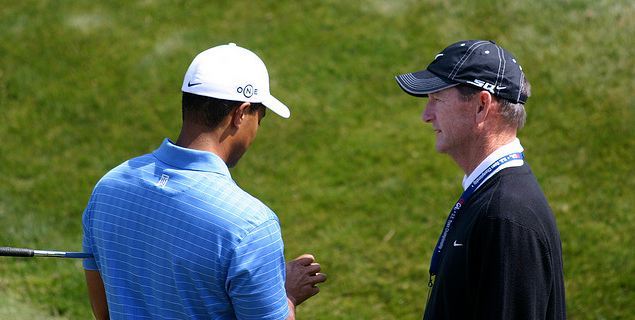
A Tale of Two Coaches: Swing Coach vs Mental Golf Coach
By Steven Yellin and Buddy Biancalana
If a sports psychologist is successful with an athlete, then the end result is the athlete’s motion becomes more powerful.
As a result of working with a sports psychologist or mental golf coach, an athlete may develop more self-confidence, develop a better self-image and develop the ability to handle pressure situations better. But it is not any of these attributes that wins tournaments. Gaining these attributes triggers something in the mind that triggers something in the muscles, which allow for fluid, powerful motion. At the end of the day, it is the swing that wins tournaments.
[subscribelocker]If it was possible to understand the mechanisms that have to occur that results in motion becoming more powerful, then it may be possible to accelerate the learning process of the muscles. In other words when a golfer has more self-confidence, as a result of that greater self-confidence, very specific transformations occur in the mind that result in more efficient swings. There could be a number of different ways that a mental golf coach is able to trigger those mechanisms, but in each different way, the EXACT same mechanisms have to be triggered. The muscles do not respond to psychological counseling. They respond to certain processes in the mind that trigger a series of transformations that result in fluid, powerful motion.
We have pinpointed exactly what these transformations are. They are universal to every athlete in every situation. They are not dependent on belief. They are rooted in a subtle science of motion.
Let’s turn to our second coach, a swing coach.
If one of his students is doing something mechanically wrong resulting in a loss of power, then he suggests the necessary adjustments to increase his power.
Let’s say the player is not making a big enough turn on his backswing. The coach makes the necessary adjustments in his swing so that he is now making a bigger turn. The student understands intellectually how the adjustments are made. He practices those adjustments on the range and on the course and is successful.
But in order for him to be successful in a tournament, he has to experience the same mental processes that the sports psychologist was able to trigger when he was working with his player. In other words, the player is not going to be able to make a bigger turn unless these processes are experienced. It makes no difference that he now understands what those mechanical changes are or that he was able to experience them in a practice round. In a tournament situation, when the pressure builds, it is not the intellectual understanding of the swing that allows him to turn more—it is the correct processes in the mind that allows his muscles to respond accordingly and produce a fluid, powerful motion.
Here is the crucial point. Muscle memory can only kick in when these processes are experienced, regardless of how many times he has successfully reproduced the motion previously. Muscle memory breaks down when these processes are not experienced. This is the reason why some PGA players never break through in their careers. When they are swinging well, the correct processes are being experienced in the mind. When they aren’t swinging well, those processes are not being experienced. It is as simple as that.
It is not that some PGA players have a clearer understanding of a golf swing than their peers. It is just that the premier golfers are able to consistently experience the right processes in the mind under pressure.
Every great athlete experiences identical processes in the mind when they are locked in. When an athlete doesn’t experience these processes, his motion does not become as fluid or powerful. We understand completely what those processes are, and we are able to teach them systematically. This is the essence of our program. Trying to repeat the motion, and hoping that these processes will kick in, is doing it backwards.
Every great athlete describes his peak performance experiences in almost identical terms because they are experiencing identical processes.
This is not on the level of sports psychology, but on a more fundamental level—the level where motion originates. The muscles respond fluidly and powerfully when these processes are experienced, and do not respond as powerfully when these processes are not experienced. There are no belief systems or philosophical tenets inherent in this. The muscles do not operate based on belief or philosophy. They operate based on subtle laws of motion that are universal to every athlete in every circumstance. Failure to adhere to these subtle laws results in forced and less then fluid motion. Aligning yourself with these subtle laws opens the door to the Zone.
What are these processes?
They are the ability to experience time moving normally and the ability to shut down the highly discriminating intellect.
This is what we teach.
[/subscribelocker]
Photo by The Gordons’



Great post Steven,
I always find it interesting to see how certain top golfers are able to perform better under pressure than others. They clearly have better control of their minds which produces better golf swings when under the gun during the pressure of a big tournament.
When some one searches for his essential thing, therefore he/she wishes to be available that in detail, so that thing is maintained over here.